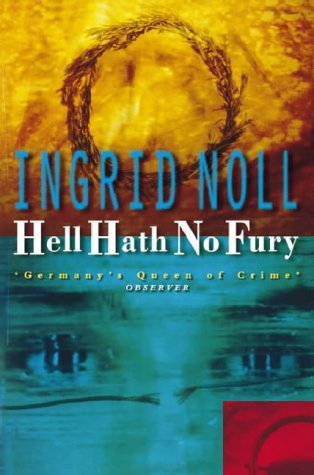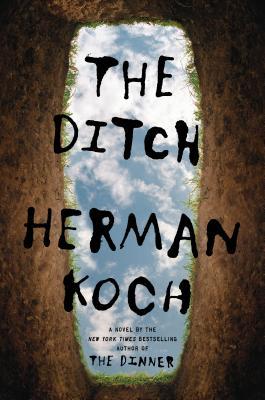“How am I to know you’re not some criminal lunatic?”
Ingrid Noll’s Hell Hath No Fury is a darkly funny tale of obsession, murder, and female competition for a worthless man. The tale, told by an insane stalker who sees her actions as perfectly reasonable and granting her a new enthusiasm for life, examines two questions: how far would someone go to get what they want and do they really want it anyway?
52 -year-old dowdy spinster Rosemarie Hirte leads a quiet life; she’s a good, reliable employee, and she’s only had a couple of romantic relationships. After being dumped by a fellow law student in her youth, she never managed to finish her degree, but instead moved into the insurance business. Now she lives in an apartment in Mannheim, and she has a friend, Beate, a woman she first knew in school. Beate, at one point, had everything that Rosemarie didn’t: a husband, a home, a family, and a social life. “Deep down” Rosemarie is “consumed with hostility towards so much sunshine,” but when Beate’s marriage ends, the two women become closer.

Due to Beate’s drive towards self-improvement and new experiences, Rosemarie first sets eyes on middle-aged academic Rainer Witold Engstern. She becomes obsessed with him, has her hair cut, begins wearing clothes that are “romantically frivolous,” and begins stalking him.
Throughout this tale, the figure of Frau Romer, an older woman who works with Rosemarie, flits in and out of the narrative. With significant health issues, she lodges her elderly dog with Rosemarie, and the dog becomes a prop in Rosemarie’s twisted schemes to be with Witold.
Now I had a crazy idea. I thumbed through the telephone directory. Where did my Rainer Witold Engstern live? Or should I just call him Witold? My first flick through produced nothing, but at last I struck oil. R. Engstern, Ladenburg–got him! Good grief, with no rush-hour traffic, I could drive there in fifteen minutes. I even dug out a street plan of Ladenburg and found his street too, a little way outside the old town. The dog was giving me questioning looks. I felt young, thirsting for adventure. I still had a jogging outfit from my last day at the spa in Bad Sassbach, although I never wore it. So, on with that, dog on its lead, down the stairs, into the car and off we go!
A few trips, later spying on Witold’s house, Rosemarie decides the mess in his home is due to his “slovenly bitch” wife, who is conspicuously absent. It’s the appearance of Witold’s wife that sets a macabre chain of events into motion, and as Rosemarie wheedles her way into Witold’s world, the women in his life don’t realize that they have a rival who will stop at nothing to win the prize. Such as it is…
Hell Hath No Fury is brilliantly and unreliably narrated by Rosemarie. She tends to see what she wants to see, and this twisted vision leads down the path to murder. Rosemarie is the sort of woman people don’t notice, a woman defined by her status and not by the bitter, seething, buried cauldron of repressed desire and emotion bubbling away just under the surface. She lives the life of a “martinet,” keeping her spleen to herself when parents wax on about their children and their love lives. Rosemarie loathes the parent-child bond, hates other women, especially if they are attractive and can cook, and she knows she is one of the “leftovers sat on the fringes like fossils.” She’s always been hiding in plain sight, but it’s her desire for Witold that unleashes her true nature.
As the story progresses, Witold is clueless, and being in his self-centered, not particularly bright orbit, Rosemarie begins to wonder if the prize is worth all the effort, but by this point, she’s narcotized by “an addictive urge,” the power of wielding life and death.
The dark humour springs from the incongruity of Rosemarie as a serial killer and the tart, spiteful inner dialogue about the people she socialises with. Most of Witold’s friends include her as a form of kindness which is rather wasted on Rosemarie. Rosemarie’s thought processes seem so very reasonable, but juxtaposed with her actions, the story takes on a macabre comic tone. She toys with the idea of whether or not to kill someone with the lightness of tone that’s more appropriate to deciding which shirt to wear. At one point she experiments with poison and decides: “No I told myself, poisoning is not my thing.”
And when I arrived at the last page, I laughed out loud.
Highly, highly recommended
Translated by Ian Mitchell
(This is one of my picks for German literature month, and many thanks to Caroline for pointing me towards this author. )











You must be logged in to post a comment.